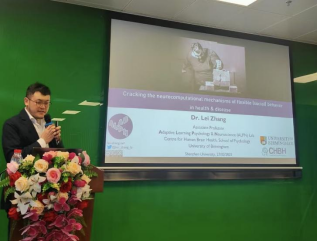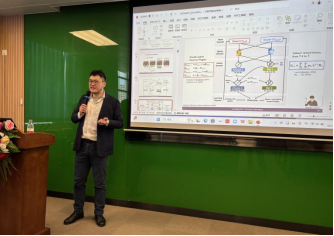On the morning of February 28th, Associate Professor Lei Zhang from the School of Psychology at the University of Birmingham delivered a lecture at the School of Psychology, Shenzhen University. The lecture, titled"Cracking the Neurocomputational Mechanisms of Flexible (Social) Behavior in Health & Disease,"focused on exploring the neural and computational mechanisms underlying flexible social behavior in both health and disease.During the talk, Professor Zhang shared a series of research findings on flexible behavior, providing faculty and students with a deeper understanding of its neural mechanisms. Additionally, he highlighted the vast potential of computational psychiatry in clinical applications, offering valuable insights into its future prospects.

First, Professor Lei Zhang introduced the concept offlexible learning behavior, which refers to how individuals adjust their behavior to adapt to new situations when the environment changes. Through computational modeling and neural mechanism research, he explored how people engage inprobabilistic learning and inference under uncertainty.Regardingsocial learning, Professor Zhang emphasized that the human brain is inherently social and that social learning differs significantly from direct learning. Using experimental paradigms, he revealed behavioral patterns ingroup decision-makingand employed computational models to analyze the neural mechanisms underlying bothdirect learning and social learning.

Next, Professor Lei Zhang shared his research findings onAutism Spectrum Disorder (ASD) patients. He pointed out that individuals with ASD exhibit significant impairments incognitive flexibility, such asbehavioral rigidity(difficulty switching behaviors according to different situational demands) and poorer performance inreversal learning tasks.Through computational modeling analysis, he identified thatsuboptimal learning parametersin ASD patients—such aslower learning rates, higher perseverative errors, and abnormal reward sensitivity—may be linked toneural mechanism abnormalities. Additionally, he introduced findings from theEuropean ASD longitudinal research project (EU-AIMS LEAP), highlighting the critical role offlexible learning behaviorin clinical research.
Finally, Professor Zhang emphasized thepotential of computational psychiatryin future research, particularly incross-species and cross-cultural studies. He also outlined future research directions, including further exploration offlexible learning behavior in social contextsand the development ofcomputational model-based clinical diagnostic tools.
